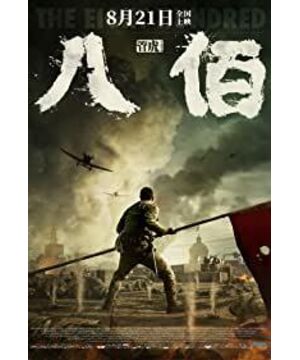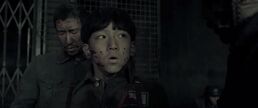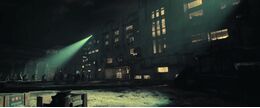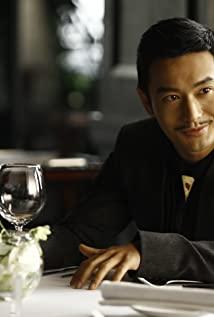The ill-fated "Eight Hundred" has finally been released. For the domestic film market, which has been in drought for a long time, this is a booster that can really bring a hot market. For countless audiences, it is also worth entering the theater. Great movie to watch.
However, the controversy/criticism about "Eight Hundred" has always been high, and it has hardly stopped from before the withdrawal last year to this year's rescheduling. Except for Director Guan Hu's previous "fascinated operation", more from the film The adaptation of the four-line warehouse defense battle, and everyone's difficult attitude towards the effect of the adaptation...
After watching the screening, the author breathed a sigh of relief. "Eight Hundred" did not live up to my previous expectations. It is a war movie that has refreshed the standards of domestic works of the same type. The shooting, technology, look and feel are better. Modern, emotional, and well-made, the film not only holds the bottom line, but also provides a thought-provoking answer to the biggest point of contradiction—the idea.
I think many people are mistaken: the historical adaptation film is originally a secondary creation, and it is not a problem to have a certain amount of fiction and artistic processing, and the film is clearly taking advantage of the situation of the eight hundred warriors to satirize the weakness and incompetence of the National Government. Those who deny the value of "Eight Hundred" with "historical facts" and "stance" have not mentioned the point.
As for the film that did not make the audience "enjoyed" enough, except for some of the reasons why it was not filmed well, this feeling is actually in place, because the sense of humiliation contained in "Eight Hundred" was not intended for people to watch. happy.
[Friendly reminder: There will be spoilers below. 】
"Eight Hundred" is not a war movie with the main theme, at least not the "main theme" in everyone's impression.
The tune of the film is as "mourned" as the defeated national army : a team of Hubei local security regiments thought they were going to Shanghai to clean up the battlefield, and then they were slaughtered like lambs by the Japanese army...
The film uses the perspectives of Lao Hulu, Dragon Boat Festival, and Xiaohu’s uncle and nephew to succinctly explain the reality of “people are like ants and life is like grass” in troubled times. Livestock, the direct descendants of the Central Army regarded them as deserters. In the context of "no one sees us as human beings", the three uncles and nephews were confusedly incorporated into the 524th Regiment.
One of the commendable things about "Eight Hundred" is that it strives to create a panoramic view of the war, with many angles and full of angles . The concession on the south bank of the Suzhou River is in stark contrast to the battlefield on the north bank where bullets are haunted. One side is heaven, and the other is hell. This is also the most dramatic aspect of the entire film.
The film is not in a hurry to show the exchange of fire on the frontal battlefield, but spends a considerable amount of time before and after to build a "stage", laying a solid foundation and constantly strengthening it, so as to ensure that the scene can be sung steadily and for a long time.
At the same time, no matter inside or outside the film, the defense of the four-line warehouse is a "play" , and those actors on stage and fans off stage are also part of the play.
Only when the inconspicuous foundation is laid, can the kung fu on the blade be more prominent. As a war blockbuster with an investment of hundreds of millions and the participation of the top domestic players in the production, "Eight Hundred" is unique in terms of audio-visual effects and immersive experience, especially for domestic war films, it has many innovations and reference significance.
The film is not content to use the perspectives of both sides to show the intensity of the battle, but will frequently use many perspectives of different characters, different heights and different lenses to enrich the full picture of the war (such as the keen eyes of veterans, the black and white shots of reporter Fang). Wait).
Of course, the climax scenes of the "Yao Hundred" are not ambiguous. For example, in the scene where Chen Shusheng jumped with explosives, the camera frequently switched from far and near, and both the Japanese and the national army were swept away. It also highlighted the precarious situation. Finally, after leaving the last words of Mingzhi's "sacrificing one's life for righteousness, what the child wants", he used the first-person lens closely following the characters to record the final scene of his life and killing the enemy, which can not be described as tragic.
Different from other war movies of the same type, the main color of "Eight Hundred" is not the common lead gray or gray-black, but a yellow-green that is close to bright and decayed. This color similar to the twilight of the end times further renders In addition, I also understand this tone as the result of mixing the grayness of the battlefield with the flowing colors of the concession, adding a few smears of blood to the yellow-green, which is more eerie.
The frontal "intensity" of the battlefield in "Eight Hundred" is very strong, and it does not shy away from the description of death/blood/violence. The scenes of broken limbs, broken arms, and blood flow can be seen everywhere, which is enough to satisfy the tastes of some types of film audiences. If you want to grade If so, at least above PG-13.
It is worth mentioning that many details in the film are also quite elegant. The careful use of flamethrowers, the failure of water-cooled heavy machine guns to cool down and the explosion of the chambers, etc., can all understand that the crew has carefully examined them.
From the perspective of war performance, the emotions of "Eight Hundred" are very full and fiery, and there are even many overly sensational places...
But in this film, the sensationalism is appropriate: Japanese slaves invaded, the country fell, the national army has been defeated and retreated continuously for more than three months, the national consciousness is far from being awakened on a large scale, and the front line is defeated and there is a lack of support in the rear. At this moment, I have to fight another battle that is doomed to fail. That kind of resentment, unwillingness, and nowhere to vent, just needs a strong emotional expression that is full to overflowing to be released.
As eye-catching as the war drama, there is also the extremely informative character group drama in "Eight Hundred".
There are various characters on the side of the concession, such as Yang Huimin, a passionate Chinese boy scout, a university professor who is full of literati and solar terms, and Fang Xingwen, a reporter who has an unclear position but can't help but be infected, etc. The one that impressed me the most is the young "pao brother" knife from the Bashu Chamber of Commerce. .
The film does not have many scenes allocated to everyone. Fortunately, the role of Daozi relied on only a few shots to capture his status and psychological changes: the backbone of the old club who opened the casino, the family members of the fallen soldiers , I wanted to stay out of the matter, but was infected by the bloody infection on both sides of the strait, and then sacrificed her life for righteousness, with all the spirit of the rivers and lakes and loyalty (in the end, Sister Rong also did a "stupid thing" and donated priceless morphine).
On this side of the battlefield, the characters are enriched, and the most typical are three people: the old soldier Youzi Yangguai who believes that "everyone has their own destiny", the only concern is the mother in his hometown; Finally transformed after there was no way to retreat; the old abacus of seeking advantages and avoiding disadvantages, who only wanted to live, was the only one who carried out his escape to the end.
"Eight Hundred" puts the main point of view on this group of rout soldiers and deserters. Although the drama of the veterans and the old fritters is profound, perhaps it is the transformation of young people that can move the audience more.
The Dragon Boat Festival is the epitome of thousands of ignorant young people who were coerced into war at that time .
The Dragon Boat Festival has never seen the world, and the most worrying thing is to go home and farm the land. He and his younger brother joined the security team probably just because they listened to their uncle's words to eat (and take a look at "Great Shanghai"), and never knew what war meant. He didn't even know that he would face death... In addition to trying to escape, all his words and deeds were passive, and he kept being led by the nose.
But the Dragon Boat Festival, who went to a private school and listened to the drama, is not completely unreasonable. The troupe does not sing Guan Er Ye but Zhao Zilong because the latter "protects the country", and the group of people around him who are not afraid of death are also warriors who protect the country. The dead Dragon Boat Festival changed his sex and made a generous act of death.
Compared with his elder brother, Xiao Hubei symbolizes the rarer and more precious purity and authenticity on the battlefield.
A child of this age is probably just entering junior high school and doesn't understand anything. He didn't even know how to escape when faced with the Japanese army's butcher knife. He was temporarily appointed as Xie Jinyuan's personal follower only because he was young and literate. ...Because of this, Xiaohubei sees the world from a more simple perspective. The white horse's outburst, the feasting and feasting on the other side, the violent death of his comrade-in-arms and his brother of the same age, and the long shadow play can all bring unforgettable memories to his little soul. impact.
By the way, in "Yao Bai", the dialogues mixed with the northern dialects are definitely a big plus. Shanghai gossip, Hubei dialect, Cantonese mandarin and other accents appear alternately, which not only increases the authenticity, but also highlights the hidden The film feels like a timeless era.
However, too many group plays and too much information have also become the defects of "Yao Bai" that cannot be ignored.
Because the main perspective has always been messy, the portrayal of many characters can only be regarded as superficial, and the film also added a lot of depictions of heroic authentic troops such as Zhu Shengzhong, Shangguan logo, Shandong soldiers, etc., inevitably a little over-the-top and careless .
Guan Hu wanted to shoot the panorama of the war too much , so the priority of the characters and the plot was not proper. Sometimes, the rhythm can only be driven by emotional shock and sensory stimulation . The overall look is not smooth and natural (some of them may be included in the deletion). .
Regardless of the subject matter, domestic films and other factors, simply starting from the "authority" of a commercial film, "Eight Hundred" belongs to the kind of film that has many ideas but has not adjusted its style and temperament , which makes many audiences shine. section, is an obvious example.
The white horse, which is out of tune with the atmosphere of the film, suddenly appeared, and it ran around and cheered, making it clear that it was for "freehand brushwork". Being spotless seemed to have an anti-war connotation, and when crossing the battlefield, it had the style of a war flag. In the fantasy of Xiaohubei, the dead Dragon Boat Festival also incarnates into the image of Zhao Zilong, fresh clothes and angry horses, rushing to kill the enemy is the epitome of national integrity and the spirit of the war of resistance...
It cannot be said that the filming is not good, but the overall atmosphere is not in place, the white horse is a little stiff, and the meaning is also discounted (this is a matter of opinion, I think there is room for improvement).
Finally, let's talk about the core and most sensitive part of "Eight Hundred". The above-mentioned production and effects are only the "skin" of the film, and the idea and spirit that you want to convey are the "bone" of the film.
First of all, we must understand that the defense of the Sixing Warehouse was disgraceful from the beginning to the end - the Songhu War and the Warring States Army suffered heavy casualties and suffered repeated defeats. In the context of the retreat of the large troops, Lao Jiang ordered the 88th Division to stay behind the Sixing Warehouse. It was purely a political show, hoping to gain the sympathy and support of the Western powers through a "live broadcast". The four-day and four-night battle was not particularly fierce. After that, the 524th Regiment guarding the Sixing Warehouse executed the retreat order. But after withdrawing into the concession, the 524th Regiment was disarmed, placed under house arrest, and later Xie Jinyuan was assassinated, and the remaining soldiers also experienced an even more wasted fate...
Therefore, the key to characterization of "Eight Hundred" is not how spectacular and tragic the war scenes are, but how to explain the retreat of the 524th Regiment.
From the author's point of view, the film has stepped on and confirmed this point. The scene in which Huang Xiaoming's commissioner, the commissioner, and Xie Jinyuan talked, made the correct tonality choice for the key turning point of the whole film. The words are very clear: I respect you as heroes, but the mediation outside failed. Let me take a step back and say that no matter whether you succeed or fail, you have no meaning to continue to hold on. The battle cannot go on like this anymore. Seed, leave some hope for the people... This is the highest order, you must obey.
The reason for the high-sounding is actually countless, and it is only pitiful that "when the family and country are broken, Xie Jinyuan, who is a soldier to serve his ancestors" and holds the belief of mortal death, does not even give the opportunity to sacrifice his life for justice . This is called nakedness. Satire.
Taking the retreat plot as the dividing line, the front and back parts of "Yao Bai" are more like two movies. The first half is bloody and exciting, and the story development is also traceable, while the second half is awkward and torn. The viewing experience It's not good, it's chaotic, it's unfinished.
This is a more advanced comparison. When I was ordered to guard, everything was simple, but it was the difference between fighting and not fighting, life and death... But after I was ordered to retreat, everything became complicated again. Ning Weiyusui's bloody bravery was dispelled, and the belief in giving up one's life for benevolence fell to nothing, leaving only a resentful sense of nihility in the hearts of the soldiers.
"Eight Hundred" carefully created (fictional) a heroic four-line warehouse defense battle. The more exciting the bloody war scenes, the more suffocating the chaos of the retreat scenes. Yangguai, Laotie, Xiaohubei, etc. There is not even a single shot of how those who stay behind stop and die - because their sacrifices have become "meaningless" in the changed context.
There are also those soldiers who were wounded and killed when crossing the bridge. They failed to be killed or injured on the front line of the resistance, but fell on the way to retreat... As more and more hands were stretched out in the concession, the film came to an abrupt end. And stop, just leave a mouthful of unpleasant turbidity for the audience.
suffocated! resentment! shame! Like my favorite anti-Japanese war drama "My Leader, My Regiment", "Eight Hundred" ostensibly tells the story of the National Army's war of resistance. upside down.
If you have to say that "Eight Hundred" is "cleaning the ground", then it is only the soldiers who fought against foreign humiliation and sacrificed their lives for the country. The KMT and the National Government, which only declared war on Japan in December, lost the mainland and now lost the island.
There are many stories of the Anti-Japanese War, but such absurd, ironic and highly dramatic stories like the four-line warehouse guard battle are rare. "Eight Hundred" picked good material and shot it to the proper level.
I understand that due to the director's inappropriate words and deeds and some problems in the film itself, some audiences will never see this film, and I have no ability to change their views, but the film has learned a lesson since it was withdrawn for more than a year. And made changes. I hope that more people can overcome their prejudice and re-understand this rare domestic war movie.
[You are also welcome to pay attention to my official account "You Love Comment Area". 】
View more about The Eight Hundred reviews











